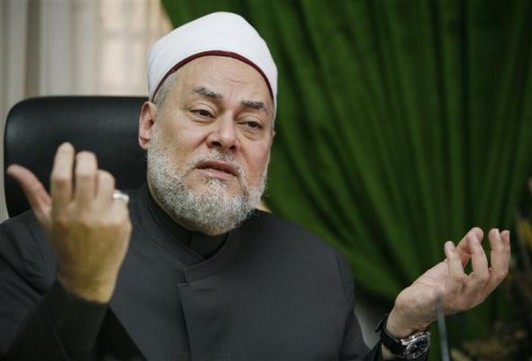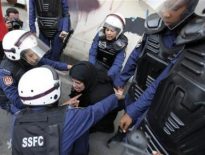
The following is a guest contribution. Reuters is not responsible for the content and the views expressed are the authors’ alone. Ali Gomaa is the Grand Mufti of Egypt.
By Grand Mufti Ali Gomaa
With the publication of yet another set of insulting cartoons against the Prophet of Islam, it is becoming increasingly obvious that we are living through dangerous times, in which the world has becoming alarmingly polarized and obstinate. The current crisis has been precipitated by a number of factors. There is no one single cause to which we can point, in the hopes that eradicating it will magically solve our problems. Rather, this is a complex matter, involving the inability of each side to misunderstand the worldviews and commitments of the other. The particulars of the events of the past week are known to all, but the underlying causes are deeper and more intractable, and cannot simply be wished away.
To properly understand them necessarily means taking seriously the politics that obtain between Islam and the West at this point in history. It is naive to simply point to individual films, cartoons, or writings which explicitly seek to provoke and insult Muslims as the motivating cause of these conflagrations. Rather, one must keep in mind the many points of conflict between Muslims and Westerners that obtain all over the world today. One need only scratch the surface to uncover grave violations associated with the war on Iraq, regular drone attacks in Yemen and Pakistan, the treatment of often innocent Muslims in Guantanamo, the demonization of Muslims by far-right European parties and the banning of their symbols by European legislatures, and the conflict that has persisted for decades in Palestine. To turn a blind eye to these serious and enduring conflicts is to remain wilfully oblivious to the underlying factors which make coexistence and rapprochement between Islam and the West so difficult.
In such a context, to then insist on igniting these simmering tensions by publishing hurtful and insulting material in a foolhardy attempt at bravado – asserting the superiority of Western freedoms over alleged Muslim closed-mindedness – verges on incitement. Of all Muslim symbols, there is perhaps none more sacred than the Prophet Muhammad himself. Muslims can barely utter his name before their conscience obliges them to pray for God to bless him and grant him peace. Hundreds of millions of Muslims revere not only the Prophet, but the very city of Medina which he made his home, and ardently aspire to visit it at their first opportunity. It is no exaggeration to say that Muslims love the Prophet more dearly than their own selves, as the Qur’an characterizes them. To imagine then, crude representations of a man so dear to them is unbearable to the vast majority of Muslims.
None of this is to condone violence of any sort. Indeed, the example of the Prophet and his Companions – the greatest sources of Muslim normativity – bear witness to their enduring the worst insults from the non-believers of his time. Not only was his message routinely rejected, but he was often chased out of town, cursed at, and physically assaulted on numerous occasions. But his example was always to endure all personal insults and attacks without retaliation of any sort. There is no doubt that, since the Prophet is our greatest example in this life, this should also be the reaction of all Muslims. As the Qur’an instrucus, “Be patient, as were the great prophets.”
The call of all Muslim leaders must be to protest these instances of hate speech in only the most peaceful manner. Violence of any sort must be condemned outright. Here it is equally important to point out that some self-appointed religious leaders have failed to act responsibly. In the tense environment that currently prevails in the Muslim world, to display these provocations and to speculate on the supposed conspiracies behind them is to act recklessly. Unfortunately, the proliferation of satellite channels and other media have opened the door to all sorts of people who have only the advancement of their own interests and popularity in mind, and not the wellbeing of the Muslim nation, the Middle East, or the world at large.
Yet, there is room for hope, and our actions should spring from the optimism that the world’s religions –Islam no less than any other – are ultimately interested in achieving harmony between peoples and peace on earth. I have, throughout my tenure as Mufti of Egypt, called for strengthening the bonds between the world’s great faiths, as well as the civilizational cultures which currently divide us as much if not more than religious affiliations. In this context, I have been involved in a number of forums devoted to dialogue across what seem to be chasms of suspicion, building across them bridges of understanding. The great virtue of these forums are that the quickly allow each side to appreciate the other’s positions, and tensions soon evaporate amongst the goodwill on display, even if agreement takes more effort and discussion. This is a model that applies to not only religious leaders, who have been at the forefront of such initiatives. Political leaders, too, must look beyond their short-term benefits and adversarial attitudes, and media outlets must broaden their horizons and take seriously their responsibility to the outside world, not just their accountability to profit margins and the bottom line.





